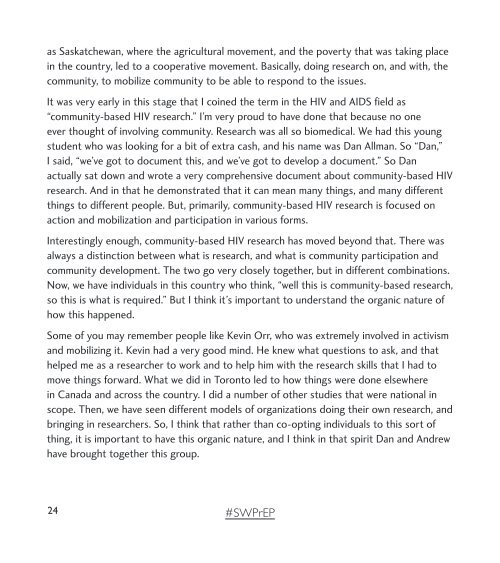HIV Pre-Exposure Prophylaxis and Sex Work in Canada 2016
SWPrEPbook
SWPrEPbook
You also want an ePaper? Increase the reach of your titles
YUMPU automatically turns print PDFs into web optimized ePapers that Google loves.
as Saskatchewan, where the agricultural movement, <strong>and</strong> the poverty that was tak<strong>in</strong>g place<br />
<strong>in</strong> the country, led to a cooperative movement. Basically, do<strong>in</strong>g research on, <strong>and</strong> with, the<br />
community, to mobilize community to be able to respond to the issues.<br />
It was very early <strong>in</strong> this stage that I co<strong>in</strong>ed the term <strong>in</strong> the <strong>HIV</strong> <strong>and</strong> AIDS field as<br />
“community-based <strong>HIV</strong> research.” I’m very proud to have done that because no one<br />
ever thought of <strong>in</strong>volv<strong>in</strong>g community. Research was all so biomedical. We had this young<br />
student who was look<strong>in</strong>g for a bit of extra cash, <strong>and</strong> his name was Dan Allman. So “Dan,”<br />
I said, “we’ve got to document this, <strong>and</strong> we’ve got to develop a document.” So Dan<br />
actually sat down <strong>and</strong> wrote a very comprehensive document about community-based <strong>HIV</strong><br />
research. And <strong>in</strong> that he demonstrated that it can mean many th<strong>in</strong>gs, <strong>and</strong> many different<br />
th<strong>in</strong>gs to different people. But, primarily, community-based <strong>HIV</strong> research is focused on<br />
action <strong>and</strong> mobilization <strong>and</strong> participation <strong>in</strong> various forms.<br />
Interest<strong>in</strong>gly enough, community-based <strong>HIV</strong> research has moved beyond that. There was<br />
always a dist<strong>in</strong>ction between what is research, <strong>and</strong> what is community participation <strong>and</strong><br />
community development. The two go very closely together, but <strong>in</strong> different comb<strong>in</strong>ations.<br />
Now, we have <strong>in</strong>dividuals <strong>in</strong> this country who th<strong>in</strong>k, “well this is community-based research,<br />
so this is what is required.” But I th<strong>in</strong>k it’s important to underst<strong>and</strong> the organic nature of<br />
how this happened.<br />
Some of you may remember people like Kev<strong>in</strong> Orr, who was extremely <strong>in</strong>volved <strong>in</strong> activism<br />
<strong>and</strong> mobiliz<strong>in</strong>g it. Kev<strong>in</strong> had a very good m<strong>in</strong>d. He knew what questions to ask, <strong>and</strong> that<br />
helped me as a researcher to work <strong>and</strong> to help him with the research skills that I had to<br />
move th<strong>in</strong>gs forward. What we did <strong>in</strong> Toronto led to how th<strong>in</strong>gs were done elsewhere<br />
<strong>in</strong> <strong>Canada</strong> <strong>and</strong> across the country. I did a number of other studies that were national <strong>in</strong><br />
scope. Then, we have seen different models of organizations do<strong>in</strong>g their own research, <strong>and</strong><br />
br<strong>in</strong>g<strong>in</strong>g <strong>in</strong> researchers. So, I th<strong>in</strong>k that rather than co-opt<strong>in</strong>g <strong>in</strong>dividuals to this sort of<br />
th<strong>in</strong>g, it is important to have this organic nature, <strong>and</strong> I th<strong>in</strong>k <strong>in</strong> that spirit Dan <strong>and</strong> Andrew<br />
have brought together this group.<br />
You may not know it, but part of it is we’re here—Dan <strong>and</strong> Andrew are here—to get your<br />
knowledge <strong>and</strong> wisdom <strong>and</strong> the questions that you br<strong>in</strong>g. Also, there’s some expectation<br />
that you have skills to take <strong>and</strong> use the knowledge that might come out of research to<br />
move th<strong>in</strong>gs forward. And I th<strong>in</strong>k it’s an expectation that if there is any research done at<br />
any po<strong>in</strong>t <strong>in</strong> time, people will use it. There is always the need to implement <strong>and</strong> use the<br />
knowledge. In my experience, much of the research that I have done has been used by<br />
organizations when they’re putt<strong>in</strong>g <strong>in</strong> proposals. Proposals for programs which support<br />
the need, or address lack of knowledge, or proposals for some other research project that<br />
they might want to do on a smaller basis <strong>in</strong> their own community.<br />
So that document that Dan wrote [Concepts, Def<strong>in</strong>itions <strong>and</strong> Models<br />
for Community-Based <strong>HIV</strong> <strong>Pre</strong>vention Research <strong>in</strong> <strong>Canada</strong>] shows how<br />
relationships with<strong>in</strong> community-based research can be very, very<br />
varied. There are always issues. Some of the issues vary with the<br />
size <strong>and</strong> scope of a project. Like a national study—it’s very,<br />
very difficult to come up with one def<strong>in</strong>itive answer <strong>in</strong> terms of<br />
what should be done because there are regional differences.<br />
There are differences <strong>in</strong> terms of the populations that are<br />
affected. There are differences <strong>in</strong> the way services are<br />
delivered. To come up with a s<strong>in</strong>gle conclusion as to what<br />
might happen can be very problematic. Sometimes it’s good to<br />
keep th<strong>in</strong>gs small <strong>and</strong> conta<strong>in</strong>ed, but sometimes you want to have it large to<br />
see how th<strong>in</strong>gs evolve <strong>in</strong> different ways; how one community can do someth<strong>in</strong>g one way,<br />
<strong>and</strong> another can do someth<strong>in</strong>g another way. And work<strong>in</strong>g <strong>in</strong> synchronicity, the ultimate<br />
goal or outcome might happen.<br />
I th<strong>in</strong>k it’s also important—you’ve heard Andrew talk about this today—the importance<br />
of build<strong>in</strong>g trust between researchers <strong>and</strong> between community, <strong>and</strong> to recognize that the<br />
skills of the community <strong>and</strong> the researcher might be quite different. And the skills of all<br />
<strong>in</strong>dividuals <strong>in</strong> this room with regards to community-based research might be also very,<br />
very different. So <strong>in</strong>dividual roles <strong>in</strong> research can vary immensely. I th<strong>in</strong>k that’s all I really<br />
24 #SWPrEP #SWPrEP<br />
25


